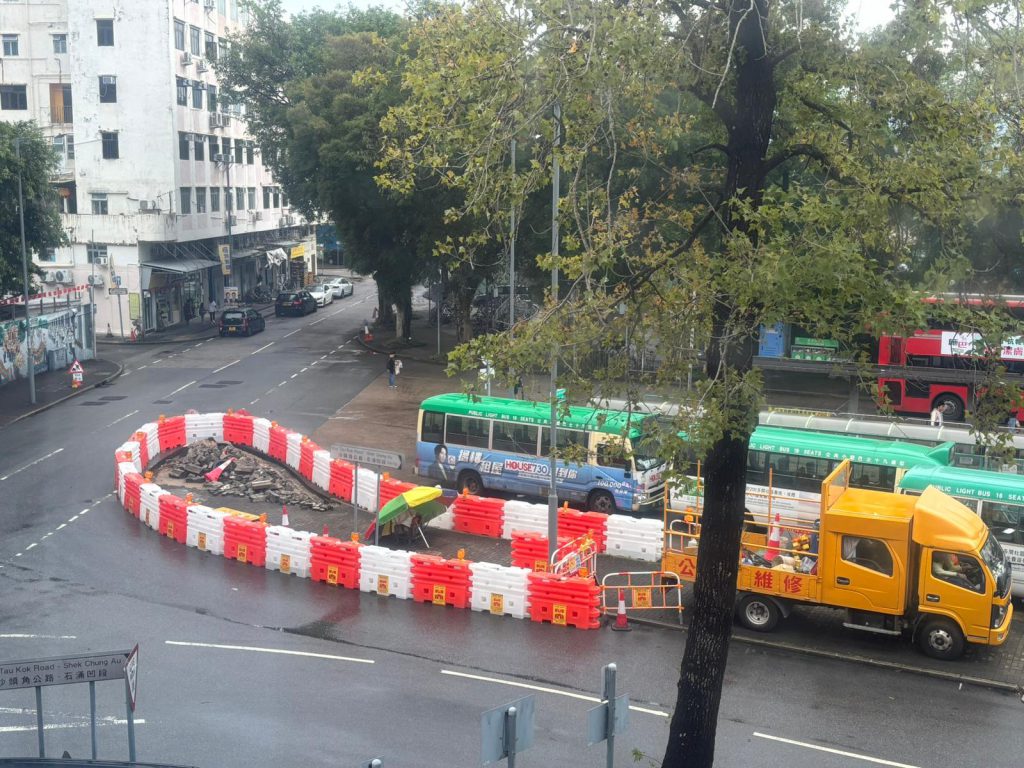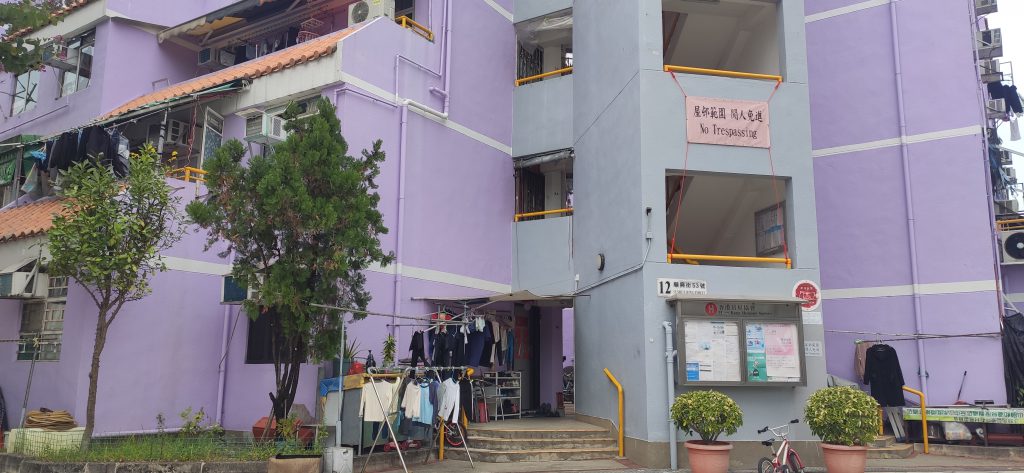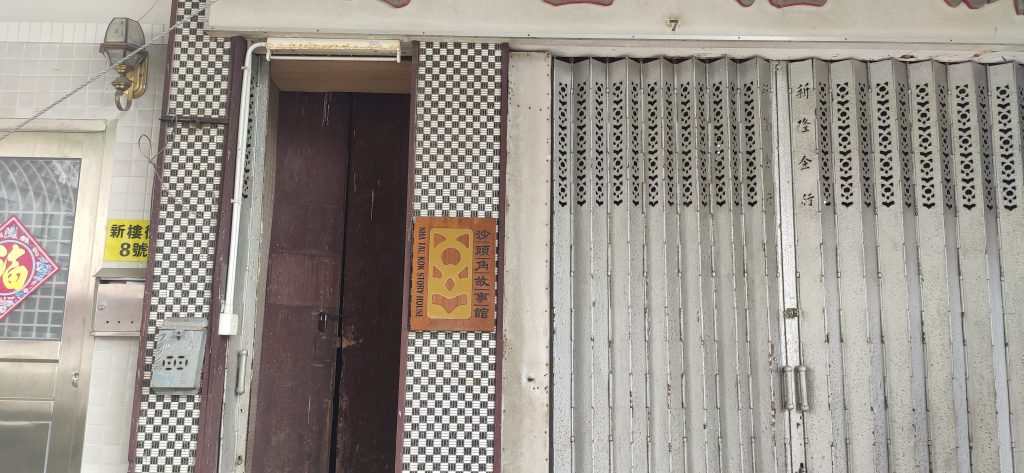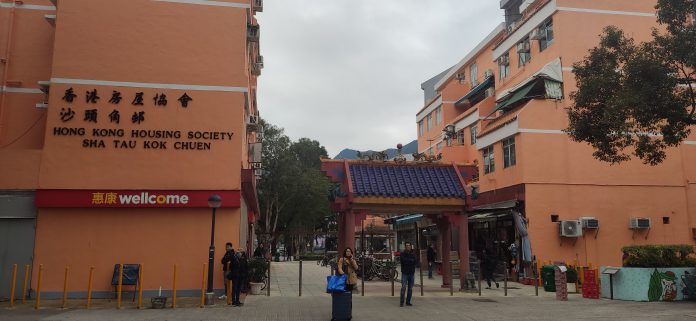Residents of Sha Tau Kok are worried about the influx of tourists that might affect the community.
By Charlotte Wu
Enjoying family time at home every weekend, the many staring eyes from tourists onto Athenea Cheung Yuen-lam’s home in Sha Tau Kok Chuen, a vibrant, French country home-style public housing estate, always leaves her feeling embarrassed.
Living on the third floor, the 19-year-old is only a stone’s throw away from the bus terminal where tourists have flooded the area since June last year.

“I find it embarrassing when I lock eyes with people on the tour bus,” she says.
Located in the north of Hong Kong, Cheung’s home is in Sha Tau Kok, a Frontier Closed Area along the border between Hong Kong and mainland China. Only holders of closed-area permits issued by the police can enter the area.
To prevent the influx of illegal immigrants from mainland China after the Second World War, Sha Tau Kok was classified as a Frontier Closed Area by the British colonial government in 1951. The government only partially opened up the northernmost town in June 2022 to promote cultural and eco-tourism.
Under a pilot scheme, 500 people are allowed to visit Sha Tau Kok Pier, the outskirts of the area, per day on weekends and public holidays.
An expanded entry scheme will kick start from January 2024, allowing up to 1,000 people to visit the restricted historic town each day. Access to Chung Ying Street, which lies on the border between Hong Kong and Shenzhen, will remain restricted.
About 4,000 people are living in Sha Tau Kok, with most of them in Sha Tau Kok Chuen, the northernmost public estate in Hong Kong, which offers 802 flats. Cheung adds that no gates or security guards are installed since residents have lived in a trusted and closed community for a long time.
While the government is about to commence the second stage opening up of the area, Cheung’s family is considering installing privacy window films to prevent visitors from looking inside their flats.
“We feel less safe as we get stared at like animals in a zoo when tourists are curious about our lives,” she says.
Since the opening up, Cheung has witnessed gradual changes in the Housing Society-managed public housing estate.
“Recently, people from the Housing Society are visiting residents door-to-door to ask for our opinion on installing surveillance cameras in our estate,” she says.
“We believe the authorities impose such measures because more visitors are coming in,” she adds.
Like many other kids in town, Cheung spent her childhood wandering around and cycling without her parents’ supervision.
“It was completely fine for children to hang around alone, especially in my generation, as we all trusted the people here and parents felt safe to let their children play alone,” she recalls.
Cheung is worried that the opening of the town will disrupt the quiet life of the children.

“My uncle starts following my cousin when he wants to play downstairs as he is worried about meeting strangers,” she says.
Another resident is also concerned about the opening up.
Haley Lee Man-hei, 19, is scared that restaurants may find it difficult to handle the influx of customers with limited choices in the town.
Most restaurants are clustered in Sha Tau Kok Market with a few more small-scale Hong Kong-style cafes, otherwise called cha chaan tengs, according to Lee.
“Most of them are closed on Sundays as the rent in the market is cheap. There have been very limited dining options for residents on Sunday already, and if tourists decide to dine in, it will increase my waiting time for food,” she says.
To Lee, the town is a tranquil safe place and she hopes tourists would not cause too much disruption to residents.
“I will be proud if tourists come and appreciate the beauty of my home. But I hope they will respect the residents here and stay quiet when visiting as it is a really small place. Silence will be too luxurious for us then,” she adds.
In response to residents’ security concerns, the Housing Society says a few security guards would be stationed in Sha Tau Kok Chuen from mid-December, and CCTVs would be installed at residence entrances from January next year.
“We conducted a questionnaire asking residents about our security measures in mid-October. Most were supportive,” a spokesman from the Society says.
Moving from Kwun Tong, a bustling urban area to the secluded town in 2012, Charles Lee Yee-keung, founder of STK 1 Properties Limited, a real estate company in the area, is confident that the Housing Society’s measures can help protect residents’ privacy.
“Tourists may peek into the flats or take pictures of residents’ homes as they are curious about the lives of residents,” Lee says.
“After security cameras and gates are installed, I believe there will be a deterrent effect,” he adds.
The businessman also runs a private museum, Sha Tau Kok Story House, to promote the fishing culture and history of the Hong Kong northern border.

He says his museum plans to launch three hiking routes for visitors after the opening up. These routes will help tourists explore the town, including visiting the remains of a section of the Kowloon-Canton railway, which used to connect Hong Kong and mainland China.
In his 2023 Policy Address, Hong Kong Chief Executive John Lee Ka-chiu says the government will collaborate with Shenzhen to develop cultural tourism in the area.
Charles Lee believes it is a must for Hong Kong to jointly develop the area with Shenzhen.
He adds that mainland developers have been revitalizing Zhongying Jie, the mainland side of Chung Ying Street over the past two years.
“As the two sides are connected, there will be a big contrast and imbalance of development between the mainland and Hong Kong sides if the government does not plan to impose any new development,” he adds.
Edited by Leopold Chen
Sub-edited by Tessa Yau, Amelie Yeung and Eve Qiao







































